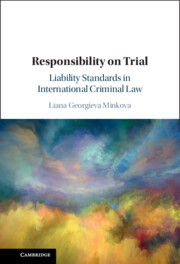Book contents
- Responsibility on Trial
- Responsibility on Trial
- Copyright page
- Dedication
- Contents
- Acknowledgements
- Abbreviations
- 1 Introduction
- 2 The International Legal Field
- 3 The International Criminal Justice Field from Within
- 4 Before Rome
- 5 Drafting the Rome Statute
- 6 Interpreting the Rome Statute
- 7 An Overview of ICC Cases
- 8 The Road to Acquittals
- 9 The Road to Convictions
- 10 Concluding Remarks
- Bibliography
- Index
7 - An Overview of ICC Cases
Applying the Principled Approach to Criminal Responsibility in Practice
Published online by Cambridge University Press: 09 February 2023
- Responsibility on Trial
- Responsibility on Trial
- Copyright page
- Dedication
- Contents
- Acknowledgements
- Abbreviations
- 1 Introduction
- 2 The International Legal Field
- 3 The International Criminal Justice Field from Within
- 4 Before Rome
- 5 Drafting the Rome Statute
- 6 Interpreting the Rome Statute
- 7 An Overview of ICC Cases
- 8 The Road to Acquittals
- 9 The Road to Convictions
- 10 Concluding Remarks
- Bibliography
- Index
Summary
Chapter 7 explores the application of the individual criminal responsibility rules to the facts of individual cases at the International Criminal Court (ICC). It looks at the facts and evidence presented by the prosecutor, as well as the conclusions of the judges at the pre-trial and trial stages of proceedings, to ask whether the requirements of the Rome Statute’s modes of liability are met. In view of the practices of the UN tribunals, many members of the international criminal justice community expected that the ICC judges would apply the Rome Statute in a manner that would render convictions easier. Instead, this chapter argues that the assessment of criminal responsibility at the Court has followed a different line of legal reasoning: applying the modes of liability in a restrained manner, regardless of the trial outcome. At the ICC the quality of the process has been cherished as the ultimate prerequisite for ‘ending impunity’ for those crimes. While this vision of international criminal law has been contested by some members of the international criminal justice field, such as human rights advocates, it has continued to dominate the ICC approach to assessing criminal responsibility.
Keywords
- Type
- Chapter
- Information
- Responsibility on TrialLiability Standards in International Criminal Law, pp. 189 - 216Publisher: Cambridge University PressPrint publication year: 2023



